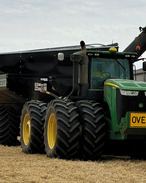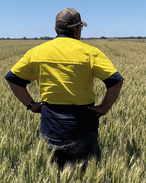This article is 5 years old. Images might not display.
Researchers at the South Australian Research and Development Institute (SARDI), a division of Primary Industries and Regions SA, said an increased inoculation rate also provides a practical way of improving nodulation where legumes are being sown for the first time, especially on hostile soils.
SARDI senior research officer Liz Farquharson said the results to date indicate that to optimise nodulation when dry sowing, application of rhizobia in high numbers is required.
"Increasing the rate of inoculant application always improved nodulation," Dr Farquharson said.
However, Dr Farquharson advises that some growers have experienced seeder blockages when they have increased the inoculation rate, so she recommends testing a small batch of seed first to avoid such problems.
Ahead of the 2019 cropping season, the SARDI senior research officer encouraged growers to take particular care if they intend applying rhizobia to seed along with pesticides, especially when sowing into suboptimal soil conditions.
"Where pesticide application is necessary, granular rhizobial inoculant or a peat slurry in furrow may provide a better option, reducing direct exposure of the rhizobia to the pesticide," Dr Farquharson said.
SARDI have been involved in a decade-long research program with GRDC investment that is working towards development of a new commercial strain of rhizobia to improve the nodulation of bean and lentil in low pH soils.
The partnership hopes the new strain will have a substantial impact in the southern cropping region where pulse production is expanding into higher rainfall areas with characteristically low pH soils.
"We believe that this new strain has potential to improve the production of pulses on around a hundred thousand hectares of ground so it's quite significant," Dr Farquharson said.
If data supports the release of the strain of rhizobia with improved acid tolerance, it is likely to be commercially available in 2021.
Meanwhile, the researchers say that improved rhizobia should be seen as an accompaniment, not a replacement, for liming.
Dr Farquharson said liming remains important to prevent further acidification and is critical to the longer term sustainability of the farming system.
"Plant root growth will also likely benefit from the addition of lime and improve overall performance of the pulse crop," Dr Farquharson said.
Research into understanding more about how rhizobia survive and nodulate under a range of stressful conditions is continuing so improved inoculation recommendations can be provided to growers.
More information on current research efforts and outcomes can be found in the GRDC Grains Research Updates paper, ‘Fixing more N - improving the performance of rhizobial inoculants in suboptimal conditions', at http://bit.ly/2uI94zy






















